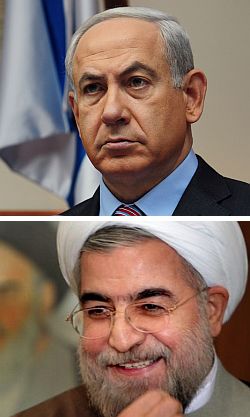Ali Mansouri, an Iranian-born Belgian citizen also known as Alex Mans, was arrested by Israel’s internal security services Shin Bet on September 11. His possession of a couple of nondescript photographs in which the U.S. embassy in Tel Aviv can be seen, has been presented as evidence that he was engaged in espionage. (Anyone who wants to find better photos of the embassy just has to use Google.)
The fact that after 20 days in detention (during the first nine of which Mansouri was prevented from consulting a lawyer) investigators don’t appear to have found sufficient evidence to put him on trial, might explain why he has yet to be charged.
At the same time, Israeli authorities were shameless in trying to exploit the political value of holding an Iranian in handcuffs as he was put on display for the press today.
Reuters reports: A man arrested on suspicion of being an Iranian spy appeared in an Israeli court on Monday and some Israeli analysts questioned the timing of the affair, suggesting it was being showcased as part of efforts to discredit Tehran’s new opening to Washington.
As Prime Minister Benjamin Netanyahu flew on Sunday to the United States for a visit focused on Iran’s nuclear program, Israel’s Shin Bet security service announced that Ali Mansouri had been arrested on September 11 on suspicion of spying for the Iranian Revolutionary Guards.
It said Mansouri, a 55-year-old Iranian-Belgian national, had photographed the U.S. Embassy in Tel Aviv and intended to establish business ties in Israel as a cover for espionage.
An Israeli official told reporters on Netanyahu’s flight that Mansouri’s picture-taking outside the embassy – whose exterior can be seen in numerous images on the Internet – was an attempt “to collect intelligence for a possible terror attack”.
That allegation was challenged by Mansouri’s lawyer, Michal Okabi, after a hearing on Monday in a court in the Tel Aviv suburb of Petah Tikva in which the suspect, who did not speak, was ordered held for eight more days.
“The apocalyptic picture that the Shin Bet is painting is a lot more complicated and the attempt to claim that our client came here in order to carry out attacks in Israel is far from reality and without foundation,” Okabi told reporters.
Some Israeli media commentators questioned the timing of the news, released in a Shin Bet statement that included photographs it said he had taken outside the beachfront mission and at Tel Aviv’s Ben-Gurion airport. No formal charges have been filed.
Asked by Reuters whether the decision to publicize Mansouri’s arrest was influenced by Netanyahu’s U.S. trip, the Shin Bet declined to comment.

 On September 11, Israel’s secret police (Shin Bet) arrested a Belgian windows and roofing salesman who is alleged to be an “Iranian agent … sent to Israel to set up a base for Iranian intelligence and terrorism networks”.
On September 11, Israel’s secret police (Shin Bet) arrested a Belgian windows and roofing salesman who is alleged to be an “Iranian agent … sent to Israel to set up a base for Iranian intelligence and terrorism networks”.